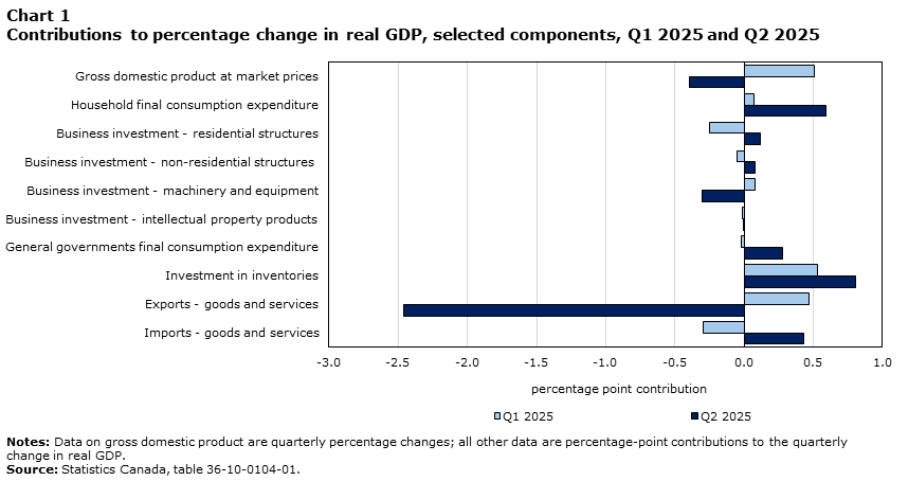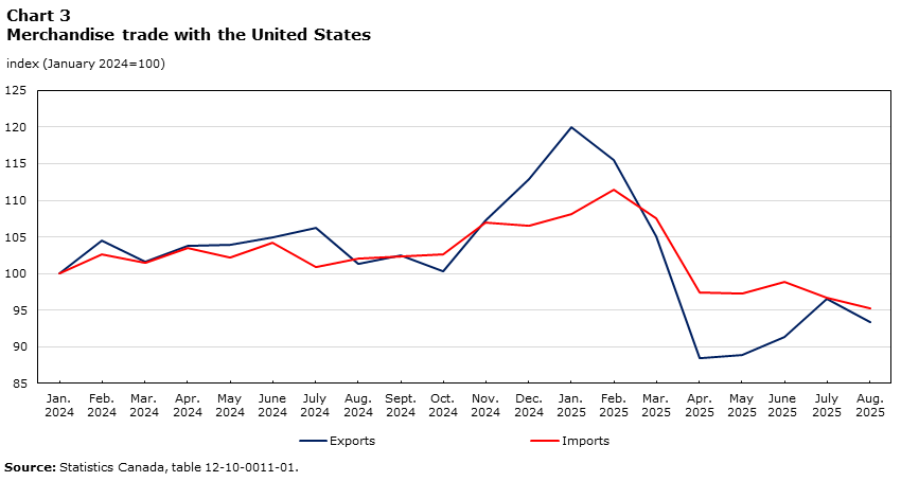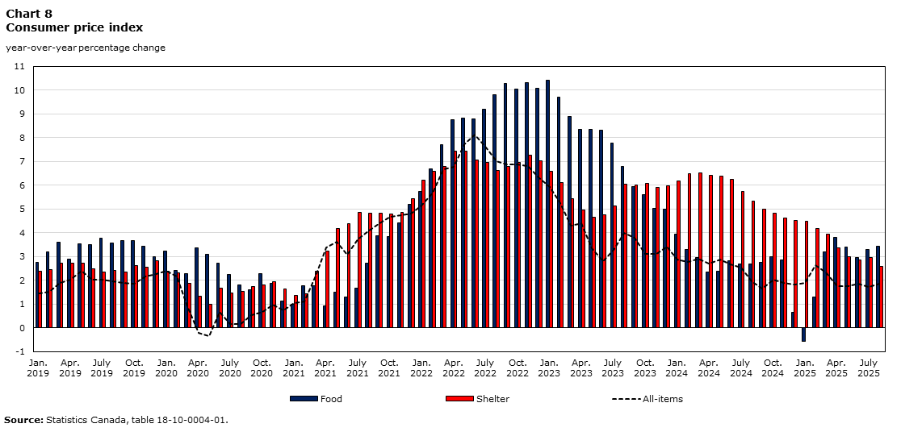What’s Going on in the Canadian Economy Right Now?
As we approach the end of 2025, Canada’s economy continues to face turbulence. Growth has slowed, exports have slumped, and employment gains have stalled. Yet markets are rallying, consumer spending remains resilient, and inflation is easing—though not in all categories.
Canada’s Economy: Exports Down, Consumers Holding Steady
Last month, preliminary forecasts suggested Canada’s economy had contracted by 1.6% in Q2, raising fears of a potential recession (Rana, 2025). However, final data from Statistics Canada later showed a smaller, but still significant, 0.4% contraction, making it the largest quarterly decline in nearly a decade outside of the pandemic period (Gellatly & McCormack, 2025).

The downturn was driven by a 7.5% plunge in exports, particularly to the U.S., where tariffs on Canadian steel, aluminium, and vehicles remain in place. Business investment also weakened, with spending on machinery and equipment falling sharply during the quarter.
Despite these setbacks, consumer spending stayed surprisingly resilient, with household expenditures rising 1.1% in Q2, buoyed by auto sales and financial services. Retail sales have now increased for five straight quarters (Switzer, 2025), helping cushion some of the broader economic drag.

Trade tensions remain central to the story. After the U.S. introduced tariffs in spring 2025, Canadian exports to the U.S. fell dramatically and have not recovered to early-year levels.

Inflation and Interest Rates: A Mixed Picture
Headline inflation dipped below 2% mid-year, helped by the removal of the carbon levy and lower gas prices. However, core inflation (excluding energy) has averaged 2.7% over the past five months (Gellatly & McCormack, 2025), and many businesses still plan to pass on rising input costs to consumers over the coming year.
Food prices continue to climb, up 4% year-over-year in September, driven by global supply issues in products like beef and coffee (Rabinovitch, 2025). While the Bank of Canada is expected to cut interest rates again, economists warn that this won’t fix food inflation, which is largely supply-driven.

Although interest rate cuts from the Bank of Canada may provide some relief for borrowing costs, economists note that rate policy has little direct effect on food inflation, which is largely supply-driven (Rabinovitch, 2025).
Uneven Sector Performance and a Cooling Labour Market
Sector performance has diverged sharply. Manufacturing and wholesale trade have weakened under the weight of tariffs and slowing demand, while retail continues to grow, supported by consumer spending (Gellatly & McCormack, 2025).

Labour market momentum has also slowed. The national unemployment rate held at 7.1% in September, with little net job growth for most of the year. Private sector hiring in particular has been soft, hovering below 2% year-over-year (Gellatly & McCormack, 2025).

Global Markets: Rallying on AI and Rate Cut Optimism
South of the border, optimism reigns. The Nasdaq, Dow, and S&P 500 all hit record highs this week, driven by strong corporate earnings and AI-fueled investor enthusiasm (Rennie, 2025). Nvidia stock jumped 5% to a new all-time high after announcing a $1 billion investment in Nokia. Microsoft’s market cap also soared past $4 trillion, thanks in part to its stake in OpenAI.
The U.S. Federal Reserve is expected to cut rates again, mirroring the Bank of Canada’s direction. Lower interest rates are seen as a tailwind for risk assets, but they also reflect a broader concern: slower global economic momentum.
What This Means for Your Financial Plan
It’s a complex and ever-changing market, and that’s likely to continue. Economic growth is slowing, yet markets are reaching new highs. Inflation is easing overall, but essentials like food remain expensive. For those looking to stay proactive with their financial planning, here are three key considerations:
- Diversification helps manage uncertainty: With trade tensions and sector-specific slowdowns, spreading exposure across different areas of the economy can help reduce risk.
- Inflation is still a factor: Even as overall inflation eases, essentials like food remain costly. Staying aware of how inflation affects your spending power is important for long-term planning.
- Flexibility supports resilience: Whether it’s adjusting timelines, budgeting for change, or responding to shifting markets, building flexibility into your financial plan can help you stay on track through uncertainty.
Whether you're a current client or someone looking to take the next step toward financial success, Alpen Investment Advisors is here to guide you every step of the way. Based in North Vancouver, our team, led by Jon Alpen, brings over 18 years of experience in helping clients grow, preserve, and navigate their wealth. With expert guidance, tailored solutions, and a steadfast commitment to your success, we are dedicated to supporting your unique financial journey.
Reach out to us today at jonathan@alpenia.ca to start or continue building your financial future with confidence and clarity.
References
Gellatly, G., & McCormack, C. (2025, October 22). Recent developments in the Canadian economy: Fall 2025. Statistics Canada. https://www150.statcan.gc.ca/n1/pub/36-28-0001/2025010/article/00004-eng.htm
Khan, A. (2025, October 27). Canada’s exports drop as tariffs weigh heavy on economy: Statistics Canada. BNN Bloomberg. https://www.bnnbloomberg.ca/business/economics/2025/10/27/canadas-exports-drop-as-tariffs-weigh-heavy-on-economy-statistics-canada/
Rabinovitch, A. (2025, October 28). The Bank of Canada could cut rates again. It likely won’t help food prices. Global News. https://globalnews.ca/news/11498632/food-inflation-bank-of-canada/
Rana, U. (2025, September 23). Will Canada avoid a recession? Here’s what economists say. Global News. https://globalnews.ca/news/11446431/canada-avoid-recession-q3/
Rennie, A. (2025, October 28). Stock indexes close at fresh records; Nvidia stock jumps to new all-time high. Investopedia. https://www.investopedia.com/dow-jones-today-10282025-11838297
Switzer, J. (2025, October 28). As exports 'plunged' Canadian consumers kept spending: Statistics Canada's pulse check on tariff effects so far. Financial Post. https://financialpost.com/news/canadian-consumers-spend-exports-plunge


